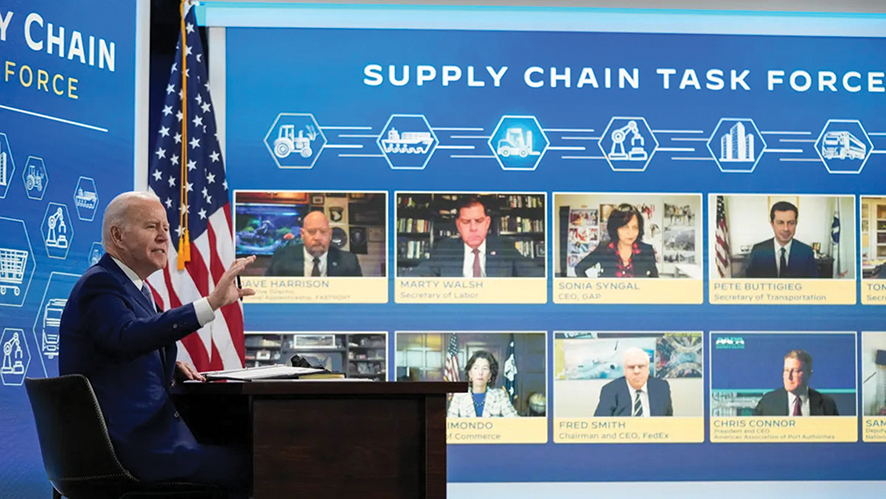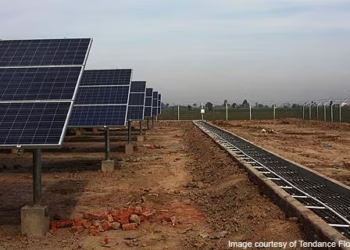We have repeatedly discussed a unified and comprehensive model of national security. Considering the complexity and multifaceted nature of modern relations, it was established in a so-called broad sense, with the widest possible scope. In other words, security today is no longer limited to military and related aspects alone – it equally extends across virtually every layer of state and societal functioning.
The Self-Sufficient Pocket Effect
At the same time, despite the aforementioned multidimensionality and comprehensiveness, the economy is considered a priority direction and a system-forming foundation of effective security. Such prioritization is, perhaps, not a particularly novel discovery. Without an economically self-sufficient and resource-based national order, discussions about the integrity, effectiveness, and unity of national security have never lacked relevance – neither in the near nor in the relatively distant past. However, in the process of a fundamental transformation of international relations and the shift toward a new balance of power, the interconnectedness of the economy and security requires renewed observation and assessment. Today, we find ourselves precisely facing such a necessity, when traditional challenges – wars, armed conflicts, recessive phenomena, external and internal extremism, and others – are now joined by the first global economic war, economic nationalism, and techno-autocracy.
Precisely in light of this reality, economic security has emerged as a leading and defining theme within the broader framework of security. It is a fact that the implementation, projection, and advocacy of state and national interests become virtually impossible under the conditions of an empty “pocket.” It is equally impossible when this “pocket” seemingly belongs to you – the country – but is, in fact, controlled by a foreign hand.
This observation, though not particularly novel, fully reflects Georgia’s current reality. However, I will return to that a bit later. For now, let us focus on a few general trends that are especially relevant to us.
Growing Security
At the global level, economic relations were subordinated to global security interests immediately after the end of World War II. The Bretton Woods Agreement and the new economic order it established serve as a clear demonstration of this. Two main pillars formed the foundation of that order: (a) greater globalism, and (b) the dominance of values in politics.
Since the 1980s of the previous century, the control of trade and investment flows through the unification of rules of conduct has come under the attention of major and regionally influential countries. Particular attention was given to the free movement of goods, people, and ideas – a process that began with the well-known Uruguay Rounds and culminated in the establishment of the World Trade Organization. The primary goal of the World Trade Organization itself was to evolve into a system of interconnected globalism, as envisioned by the Bretton Woods framework. It was also considered a doctrine that democracy and capitalism were to be seen as a unified concept and that these two components would organically support each other in expansion and strengthening.
It is clear that the evolution of this process was shaped by a number of other significant initiatives – mostly guided by an Anglo-Saxon leitmotif. For example, the activation of the G-20 group aimed, as much as possible, to establish a conflict-free global economic ecosystem. However, neither it nor any other project was able to save the global economy from the 1999 financial crisis. At this point, it’s also worth recalling the well-known 2008 crisis, which likely sparked early American skepticism toward the liberal economic order and laid the groundwork for the demand for a Trump-style political leader.
Clearly, alongside the unification of rules, the key actors did not forget their own interests – which, under institutionally rational conditions of “containment and balance,” is also a normal occurrence.
As a result of events already well known to the reader, the above-mentioned control has now taken on an overtly protectionist content, with leading economic systems openly embarking on a path of autarky (nationalism). At the same time, relatively benign concepts such as the “trade balance,” “direct foreign investment,” and the “balance of payments” shifted from the classical commercial dimension to the security dimension: in other words, they were “securitized” – becoming instruments of pressure and coercion for foreign purposes (weaponization).
From the same perspective, the global and subregional routes for the supply and delivery of mineral resources fundamentally transformed in their purpose. As a result, access to and control over certain geographic areas became critical. In this matter, some act in a way that practically reminds one of the 1884-85 Berlin Conference, which, during its discussions on Africa, laid the foundation for the concept of “spheres of influence.” It is also worth noting that obtaining such control today spans multiple dimensions — military, economic, institutional, and “soft power” – and now, new control is also exerted through multinational corporations. The agreement on mineral resources between the United States and Ukraine is a clear indicator of this “new wave” in the process.

When talking about the supply chain…
…Which is one of the most critical components of economic security, it is essential to highlight several “order-forming” factors. In particular, the growing trend of economic nationalism, which is naturally accompanied by restructuring in accordance with a unified security system, was preceded by:
(1) A significant shift in global economic opportunities toward Asian countries – particularly China and India.
What is especially noteworthy here is the new understanding of China’s growing influence and the resulting economic security shaped by that influence. I will briefly add that when discussing influence, “domination” and “leadership” are two distinct categories – a distinction clearly observable in the case of China. Specifically, if we look at the period up to the present, the goal of official Beijing has not been to dismantle the existing order, but rather to adapt it to its own interests – by maximizing its influence from within that very order.
(2) The distribution – a kind of diffusion – of power between state and non-state actors, with the latter’s influential voice becoming increasingly prominent.
(3) The excessive monetization of foreign policy objectives, examples of which are now abundantly and openly on display.
(4) The intertwining of corporate and oligarchic interests with state policy to such an extent that, as a result of this “fusion and blending,” it becomes increasingly difficult to distinguish one from the other.
(5) The absolutely unique role of techno-oligarchy in contemporary domestic or foreign policy, which lays the foundation for an entirely different form of governance.
(6) The increased confidence and proactiveness of Middle Powers in the emerging “disorderly order.” In the foreseeable future, it will become increasingly difficult to force such countries to relinquish their “hard-earned” autonomy, while their tendency toward hedging and balancing will remain relevant.
(7) The rise of regional centers, often under the influence of regional hegemons or even driven by their claims over a regional “sphere of influence.” At the same time, alignment in interests and risk assessments outlines both a new understanding of “regionalism” and emerging contours of interregional integration.
(8) The place of the Global South in the global economic “polyphony,” which, in my opinion, still does not possess a homogeneous character. In this regard, the absence of a unified concept or handwriting should be attributed to the following main factors, namely: Is the “Global South” considered with or without India and China? And (b) Is the “Global South” considered with or without the Middle East?
In my view, the answer to both questions is negative.
(9) Updating the economic security agenda by further deepening cooperation in international organizations (from BRICS to the so-called “Asian NATO”). This trend is likely to intensify in light of the definitive end of the “disorderly order” and the unipolar world. Objectivity also requires noting that this trend, intentionally or unintentionally, is supported by the current US administration, which is moving from hegemony to hedging money.
As I have already said, these and related factors help us to better analyze security in a broader sense and to better understand the mechanisms that, to a greater or lesser extent, balance the relevant risks across Georgia.
With regard to economic security…
To illustrate this point, I will mention a few key aspects related to the global supply chain.
Specifically, having adequate control over such deliveries and supplies has two practical advantages:
(1) That the adversary or/and competitor is unable to obtain information valuable to the target country’s security, and
(2) That the adversary or/and competitor is unable to damage the critical sectors of the target country’s economy.
Such risks are particularly relevant under a liberal economic system, where – alongside competitiveness and efficiency – the openness of the system also brings with it a certain degree of vulnerability. Moreover, the greater the level of global interconnectedness and interdependence, the more significantly vulnerability increases.
The response to these challenges was the establishment of the Supply Chain Resilience Council in the United States and the development of the Industrial Defense Strategy. In order to strengthen the country’s economic security, a number of other measures were also undertaken – some justified, while others remain highly debatable. I have discussed several of them in previous publications and will not dwell on them here.
Also noteworthy is the adoption of the so-called CHIPS & Science Act by the United States in 2022, which envisioned a $50 billion investment to support domestic semiconductor manufacturing. In fact, for the past half-century, this was the most ambitious state initiative for domestic production. Its declared goal was to strengthen the supply chain by reinforcing an economic sector critical to national security.
A separate matter is how effective such a set of measures will prove to be in ensuring truly invulnerable security in the economy. Achieving real results largely depends on the government’s ability to respond swiftly and efficiently, as well as on clearly and accurately defining the objectives.
In this same context, it is also important to consider, on the one hand, the degree of the United States’ integration into the global economy, and on the other hand, the behavior pattern of its main competitor – China – especially under conditions where both countries are so deeply economically interdependent.
Since we mentioned the US-China economic relationship and related security issues, it is also worth briefly addressing the particular characteristics of China’s behavioral patterns. Their specificity poses a special challenge not only for the United States but also for other countries in terms of neutralizing threats originating from China.
First and foremost, when discussing Chinese specificity, it is important to highlight the approach based on the principle of the so-called “comprehensiveness.” The essence of this principle is that:
(1) The promotion of national and economic security interests is served not only by the combination of human and technological resources, but also by the fact that:
(2) Based on the so-called “principle of comprehensiveness,” the acquisition of necessary information for Beijing is the responsibility of all segments – whether governmental, business, military circles, or the diaspora. This approach is fundamentally different from that of the West, where the collection of relevant information is the exclusive responsibility of relevant official institutions.
Moreover, according to China’s strategic approach, if the creation and development of a particular technology is not possible using domestic resources, acquiring it from foreign sources – by any means – is considered permissible. The emphasis on ‘any means’ is explained by the fact that, following ‘a century of humiliation’ at the hands of the West, the primary goal of the People’s Republic of China is to use all possible methods in pursuit of ‘national rejuvenation’.”
Ultimately, such practice established by China conceptually aligns with the notion of ‘comprehensive national security’. Moreover, it is deliberately and indiscriminately directed toward key sectors of the economy such as artificial intelligence, quantum computing technologies, synthetic biology, semiconductors, aviation equipment, green technology, robotics and automation, nuclear technologies, etc.
Read Part 2.
By Victor Kipiani, Geocase Chairman














